#Reincarnation stories in India
Explore tagged Tumblr posts
Text
The Curious Case of Shanti Devi
Not every day do you hear a story where you are not just left puzzled but also get you all too excited to read more about – and even write about. While working on a project about Members of Parliament, I encountered someone called Shanti Devi. The story of Shanti Devi is both fascinating and very well-documented. For years, her case garnered significant interest among political leaders, freedom…

View On WordPress
#Adarsh Badri#arya samaj#Bal Chand Nahata#birth of Shanti Devi and the complex reincarnation lives#gandhi and reincarnation connection#Ian Stevenson#interest of political leaders in shanti devi story#Lugdi Devi#Lugdi Devi reborn#Punarjanma ki Paryyalochana#real life reincarnation stories#Reincarnation in India#Reincarnation stories in India#Shanti Devi#Shanti Devi as Lugdi Devi#Story of Shanti Devi
0 notes
Note
hi there can i ask what are your favourite fics??
ahhhhhh this was so hard to narrow down since i think i have something like 300 beatles fics bookmarked on ao3 (plus a ton saved from livejournal but i’ve only included ao3 ones here). at first i was gonna pick a top 5 or top 10 but that was too hard so here are my top 24-ish i think? could have picked a lot more tbh. i only included fics that are completed, even though there are a lot i love that are either WIP or abandoned. also didn’t include any modern AUs though there’s a lot of those that i love as well! if anyone has any specific requests for other fic reqs i’m always happy to suggest more :)
on our way back home by kathleenishereagain
this fic has the most kudos in the fandom for a reason! old paul time travels back to the touring days and his relationship with john changes from there. love the way they integrated the magical realism into this and it’s just such a beautiful, touching story.
knowing that the sun is there by tarenas
john comes out after brian dies. lovely look at john’s individual relationships with all of the beatles and cynthia (but especially his relationship with paul of course)
cutting water with a knife by savageandwise
may’s perspective on john and paul. love love love. heartbreakingly realistic and so poignant. feels like it could have been a cut chapter out of loving john.
i’m so tired, my mind is set on you by dornfelder
god how i wish this is what would have happened in india. i’ve read this fic so many times, it just feels so real i keep coming back to it.
india, actually by inspiteallthedanger
jane notices that john’s india tapes are all of paul a la love actually. love jane in this and paul and john’s dynamic is great.
grow old with me by inherownwrite
john and paul in scotland in the 80s - paul breaks his arm and gives john a fright. such a tender picture of what could have been had things not ended how they did.
i was a younger man then (now) (post hoc) by fingersfallingupwards
using the time traveller’s wife premise in quite literally the best way i have ever read. the way it unfolds is…. stunning.
having coffee by dornfelder
old paul and john reflecting on life and being outed in the 80s through an interview. lovely.
to lead a better life by downtothelastdrop
1966 ringo mistakenly thinks john and paul are together, leading to a revelation of paul’s own.
going nowhere by inspiteallthedanger
fix-it where after surviving the shooting, john moves back to england.
if i could choose my own name, it’d be the one that falls best from your lips by kandakicksass
one of my favourite reincarnation fics ever. i really enjoyed how simple it was, how the pieces just slid into place so naturally.
the birthday party by merseydreams
everyone reunites for ringo’s 40th in july 1980. an excellent look at the dynamic between all the bugs and how things could have gone.
something old something new by inspiteallthedanger
john shows up to pattie and eric’s wedding causing a beatles reunion for the first time in years and some shenanigans and talks with paul. this fic is hilarious and THIS is my george, i love him so much
1967 by please_dont_wake_me
paul and john stay in paris after their 1961 trip. they return to liverpool in 1967 as a couple. this feels so real, the way every minor character is written… the dynamics between them all - every detail is excellent.
the beatles holiday au series by econhomework
an AU that follows john and paul (and george/ringo) being a committed couple in the 60s/70s and having their children via surrogacy. i’ve been subscribed to this series for years now and it’s a lot of fun getting an update that builds upon the last around every holiday, giving a little snippet into their lives as the kids grow up chronologically. (they also have other fics set in this AU in their beatles fic requests series)
the brother dearest series by javelinbk
jim and mimi get married, causing john and paul to become step-brothers (sort of). interesting premise and an even better execution of it. not to mention the idea of jim and mimi getting together will never fail to make me laugh (but also sort of makes a lot of sense???)
how much was mine to keep by mynamesbetty
paul is ‘unstuck in time’ and lives his life out of order a la slaughterhouse five (one of my favourite novels). done very well.
take a sad song and make it better by javelinbk
1980s paul moves his ex-boyfriend into his house because he’s an idiot but i love him. great fix-it.
christmas lights (keep shinin’ on) by distinguished_like
paul invites john to the mccartney family christmas party, leading to some discussions between the two. very cute early years fic.
here today by herspecialagent005
december 1980 except john and paul are hosting a dinner party for some friends in scotland, with magical realism elements. ugh loved this so much, especially linda and just all the little details of john and paul settling into a life together.
kissing the blarney by tikk
paul is the blarney - this turns into a superstitious ritual in the band which emotionally complicates things but ends very satisfyingly.
writing letters (on my wall) by 15clubsaday
70s paul writes to john under a pseudonym while they aren’t speaking. newly finished and wonderful!
the jumper by merseydreams
john sees denny laine wearing HIS jumper and flies back to england to retrieve it. this fic has everything: miscommunication, john being a dumb shite, jealousy, confused denny laine, paul in all his 70s glory, and lesbian linda. truly could not ask for more.
back to where you belong by sleeprettydarling
george on johnandpaul throughout the early years. i’m a big sucker for the george & johnandpaul dynamic and how complicated and devastating it can be so naturally i loved this.
#sorry this is so long anon! but thanks for the ask hope you found some new fics to check out! :)#asks#mclennon#beatles fic#john and paul#beatles rpf#john lennon#paul mccartney#the beatles
160 notes
·
View notes
Text










Prithviraj Sukumaran as Shiva mannar
The background story for Shiva Mannar for me is that he was actually really close with Deva’s grandfather, that’s why after he ascended the throne he wanted the successor to be from the Shouryaanga tribe so they too would have a chance to rule khansaar.
If anyone watch Avatar the last airbender it was like Roku and Shozin kind of relationship.
If Deva’s grandfather was played by Prabhas too then I will be even more wilding in my imagination going as far as thinking about Shiva and Deva’s grandfather as lovers 😂🤣 I mean they fought side by side to win the war and make Khansaar independent. It was easier in the past because the enemies was actually outsiders who want to colonize their lands and now they fought amongst themselves 🥲
It was a well known secret that they would share everything together, will protect each other so fiercely abut they still have to get married traditionally with a woman for heir and stuff. Imagine that Amma actually know this story, she heard it from her own grandpa who fought side by side with them too during war. Shiva mannar was so devastated when Deva’s grandfather died during one of their battle, actually the last battle before they officially erased their map from india.
And Amma when she realized that Deva was head over heels for Varadha who was a splitting image of his own grandfather and many people also said that Deva was actually really resembling his own grandfather and even went as far as speculating that he was his reincarnation because he inherited his strength, so Amma was like “they couldn’t be together in the past life now they want to be together in this life” and she knows that there’s nothing she could do to stop them to be together this time.
#salaar#varadha rajamannar#prithviraj sukumaran#varadeva#shiva mannar#look at those big biceps#and the way he walked#like he is so different from varadha#people wouldn’t even realize that the 2 characters were played by the same actor#that’s how good prithvi is in embodying different character#best of his generation for sure
59 notes
·
View notes
Text
You ship the two dudes from RRR so you watched more Tollywood movies to see if there was anymore Fruity love stories but were disappointed finding out Tollywood actively stays always from Gay. Don’t worry I got you
So after Western audiences and he’ll even some brown people watched RRR They began to heavily ship Ram and Bheem.
I mean I get it two dudes back in like the 19th century India on rival sides of an internalized War becoming friends by chance and giving up their believes for said friendship to save said person from their ultimate demise while looking incredibly badass while doing it definitely gives some signals.
Sorry to disappoint though Rajamouli actually denied making Ram and Bheem canonly fruity and established hetero love stories for them due to the fact Most of Tollywood has little to never actively shown fruity characters sometimes making fun of them (transgenders we’re usually used to highlight ‘bad’ beauty in musical numbers dancing around the hero only to accentuate the beauty of the heroine). So for his own protection and to make sure RRR wouldn't flop Rajamouli forced Ram and Bheem to have Jenny and Sita as love interests kinda like the meme 'born to repost, forced to private'.
Some movies in Tollywood don’t actively hate on it though and yes use it as a laughing gag but then again Westerners often use the expression “Yes Queen” and that’s what I’d typically reference these gags to.
However I was rewatching some movies of a Tollywood actor named Ram Pothineni whose movies I grew up watching and still watch. One of my favorites is “Endukante Premanta” because it’s a reincarnation love story and I love reincarnation love stories plus it takes place on Paris something I realized years later.
Anyway so Ram Pothineni in 2013 starred in a movie named “Masala” along with another Popular actor from more older times like early 2000s and a bit before his name is Venkatesh Dagguabti.
So basically the movie itself is average you’d get it more if you were brought up in Tollywood Cinema like me.
The basic plot line is there’s the Muslim guy named Rehman who wants to get his sister married as his brotherly duty towards her however the face problems in a court case where their house is seized so their uncle transfers them to the village where their uncle lives and helps Rehman find work.
When Rehman arrives at this village an incident occurs where a little boy was climbing a stone gate to a building to get his Kite and accidentally falls on the other side of the Gate into the water. Past the Gate is a Temple that is closed off due to Legal Problems. Seeing the boy is drowning in the water Rehman smashed the lock to the gate and baits the door open diving into the water saving the boy. He gets in trouble with a few of the residents who are mad at him for breaking the gate open since the Temple being closed was a major issue in the village. However Balaram a very respected figure in the village intervenes supporting Rehman for his efforts in saving the kid Balaram was actually involved with the Temple closing incident with the Antagonist of the film his cousin who is intent on marrying Balaram’s sister which Balaram dislikes. After this incident Balaram decides to take the temple into his custody again thanks to Rehman’s effort with the support of the village people.
A thing you should know about Balaram is that he doesn’t tolerate Lies at all he’s a very good man helping everyone in the village at their time of need but no matter how big or small the lie is he will punish the other party for their lie. When Balaram asks Rehman for his name Rehman’s friend Siri lies telling him that it’s Ram a traditional Hindu name fearing that if the village people were to find out that it was because of Rehman a Muslim guy the Hindu temple reopened there would be problems since Islam and Hinduism are opposing faiths and even though they can tolerate the other faiths some people might not feel that way since it still is a sensitive topic.
Because of that one lie Rehman is forced to enter a rabbit hole of lies hiding his Muslim identity pretending his mother who died when he was young is still alive and that he’s a singing teacher in order to make sure Balaram won’t get suspicious of his lying.
Now the main point is Rehman in this movie for one of his lies is forced to pretend he has a younger Muslim stepbrother that looks just like him because Balaram’s advisor and him saw Rehman at a Mosque. Rehman’s fake younger brother character who he acts is a dancer by profession and is gay. Yep that’s the laughing gag.
However in the movie Rehman’s fruity character in my opinion isn’t really disrespectful at All There’s not really any homophobia to the character and he acts like any fruity man you’d see on TikTok with “Slay Queen” and “Yes Girly Pop” which is kinda translated into Telugu. He acts very fruity in his role which is like he’s supposed to because his Make believe younger brother is fruity. Rehman has Balaram’s men (his workers) actively questioning their sexuality with Rehman’s provacative actions in the movie. Sure Rehman is only pretending and hits them when they get too close and the workers take no for an answer (another victory if you see the earlier Telugu films at the time). Balaram hires fake Gay Rehman as a dance teacher for his younger sister since he doesn’t trust normal men around her since his cousin wants to marry her and has tried kidnapping her on multiple occasions. Balaram trusts ‘Rehman’ since he’s Gay though.
The actual Rehman ends up with the heroine in this case Balaram’s sister Meenakshi at the end of the movie revaluing his lies and being forgives but I fully believe Rehman was Bi in this movie. How he acted even when he wasn’t playing his fake character of his younger Gay brother was kind of fruity his voice alone will sometimes give you like James Charles kinda voice if you get what I mean.
I mean it’s not perfect in representation it’s still a Tollywood movie from the 2010s too but it is really progressive compared to the other movies and I found Tehman’s character when he was acting fruity or just pretending to be Ram or just his normal self was really funny.
see if you want to see another possibility of LGBTQ in Tollywood cinema you can watch This. I’m pretty sure you can watch the subtitle version on Einthusan.
#tollywood#ram pothineni#indian cinema#lgbtq community#indian lgbt#Masala Telugu movie#RRR#movie recommendation
36 notes
·
View notes
Text
The Monkey King 2 (2016) 西游记之孙悟空三打白骨精











Director: Zheng Baorui Screenwriter: Ran Ping / Ran Jinan / Wen Ning Starring: Aaron Kwok / Gong Li / Feng Shaofeng / Xiao Shenyang / Luo Ziyi / Fei Xiang / Kelly Chen / Ngawang Rinchen / Peng Yu / Cheng Dong / Liu Chutian / Yu Xin / Wei Lu / Qi Xier / Mu Qi Miya / Zhang Zimu Genre: Comedy / Action / Fantasy Country/Region of Production: Mainland China/Hong Kong, China Language: Mandarin Chinese Date: 2016-02-08 (Mainland China) / 2024-09-14 (Re-release in Mainland China) Duration: 120 minutes Also known as: Journey to the West: Havoc in Heaven Sequel / Journey to the West: Three Strikes of Bone Demons / Three Strikes of Bone Demons / 西遊記之三打白骨精 / 西���记之大闹天宫续集 / 西游记之三打白骨精 / 三打白骨精 IMDb: tt4591310 Type: Retelling
Summary:
500 years after Sun Wukong's (Aaron Kwok) imprisonment under the Five Fingers Mountain, a young Buddhist monk Tang Sanzang (Feng Shaofeng) sets out for a journey to the Thunder Monastery in India to collect Buddha's scriptures. When he is attacked by a tiger, he is forced to free Wukong and the Monkey King learns that he has to protect the monk throughout the journey, because the Bodhisattva Guanyin ensured he would be bound by an enchanted circlet that can cause him pain whenever Tang Sanzang chants a certain sutra. Soon the duo meet Zhu Bajie (Xiaoshenyang), a lustful pig demon, and Sha Wujing (Him Law), a djinn-like monk. He fights a dragon, defeats it and transforms it into a horse as his mount.
The company travel to the Yun Hai Xi Kingdom, a land terrorized by the White Bone Demon (Gong Li) who has been eating people in order to extend her unnatural life and avoid the Wheel of Reincarnation. As the demoness learns about Sanzang, she decides to eat him in order to stop her reincarnation cycle and achieve everlasting demonhood. She takes the appearance of an old woman and lures the group into a cottage in the woods. To prevent Wukong from using his truth-seeking eyes to see through her disguise immediately, she throws tainted dust into his eyes that clouds his sight. Then while her disguised minions keep Wukong, Bajie and Wujing occupied, the demoness tells Sanzang a story about how she was forced to marry as a young girl, and when her village suffered famine, the people blamed her for it, even calling her an evil demon, and attempted to kill her as a sacrifice to the gods. As Tang comforts the old lady, she attempts to kill him, but is stopped by Wukong. The demoness escapes before Wukong can deal the killing blow and leaves the dead body of the old lady behind. Sanzang and the others don't believe Wukong that all the women he murdered were demons, and blame him for killing the innocent. Sanzang punishes Wukong by chanting the sutra and causing the circlet to tighten painfully on his head. Afterwards, Sanzang climbs to the top of a mountain where Wukong is sulking. Sanzang tells Wukong he thinks they are both very alike, for they both only trust what their own eyes sees. But together, they are better able to discern the truth. This is why they were all chosen to be on this journey together.
The group arrives to the kingdom's capital and the King (Fei Xiang) throws a feast for them, begging Sanzang to exorcise the bloodthirsty demoness from their land. Suddenly Lady White appears and demands the monk, but he offers her his help in enlightenment instead. She tells Wukong that they are both very alike, and tries to persuade Wukong to let her devour the monk, but he deceives her instead and a fight ensues. During the chaos, the King's guards kidnap Sanzang. It is revealed that it's actually been the King kidnapping and killing the children in a desperate attempt to cure himself of a cursed disease by drinking their blood. He tries to kill Sanzang, but Wukong arrives and saves the monk and the surviving children as well. All of the group are celebrated as heroes, but as a little girl approaches Sanzang, Wukong beats her and her mother to death as well, because his truth-seeking eyes perceive both were possessed by the White Bone Demon. In a fit of anger and disbelief, Tang banishes Wukong away. As soon as Wukong leaves, Sanzang gets kidnapped by the demoness.
In the demoness' lair, the White Bone Demon gives Sanzang a day to convince her to give up her evil ways and embrace nonviolence and enlightenment as the true path to immortality. She reveals to him the story she had told him earlier was true, recounting her previous life as a mortal. Right before Sanzang's time is up, he is saved by Wukong at the last minute. Wukong, Bajie and Wujing fight the White Bone Demon and her army and finally defeat her, with Wukong mortally wounding her. The Buddha comes down from the Heavens to collect the defeated demoness' soul and banish it to oblivion but Sanzang pleads Buddha to grant her mercy and give Sanzang one last chance to save her soul from destruction. Buddha tells him that he would have to lead her on the path herself, meaning he would have to sacrifice his own life. The monk begs the demoness to show remorse and accept the Wheel of Reincarnation, but the White Bone Demon would rather die as a broken tainted soul in Sanzang's body instead of returning to the Wheel of Reincarnation. Saddened, Tang begs Wukong to kill him, too. The Monkey King refuses at first, but Sanzang explains how he used to think he just had to recite Buddha's teachings to convince people to become good. Now he understands he must also lead by example and do good in order to convince people. Sanzang had to do this for his own journey towards enlightenment. Wukong finally understands the monk's desire to help the demoness change her fate, and tearfully agrees, promising Sanzang to wait for his return. Wukong brings his staff down and Sanzang's body is changed into a statue. In return Sanzang says if he gets a chance to do so in his next life, he would be glad to be Wukong's master again. Because of Sanzang's sacrifice, he succeeds in leading the demoness to her next reincarnation, freeing her of her pain and hatred.
Some time later, Wukong and his friends still wait for the return of the monk, but continue their journey to the Thunder Monastery. Wukong rides on Sanzang's horse with Sanzang's statue strapped to his back. From Heaven, Guanyin drops a bead of water from her magic vase that falls to earth and hits right at Sanzang's hand. The surface cracks, revealing a human finger underneath.
Source: https://movie.douban.com/subject/25827963/
Link: https://www.youtube.com/watch?v=_A7XSayGf04
#The Monkey King 2#西游记之孙悟空三打白骨精#Journey to the West: Havoc in Heaven Sequel#Journey to the West: Three Strikes of Bone Demons#Three Strikes of Bone Demons#西遊記之三打白骨精#西游记之大闹天宫续集#西游记之三打白骨精#三打白骨精#jttw media#jttw movie#movie#live action#retelling#rewrite#sun wukong#zhu bajie#sha wujing#tang sanzang#The Monkey King#Sun Wukong#White Bone Demon#Tang Seng#Zhu Bajie#Sha Wujing#King of Yunhaixi#Guanyin#Porcupine Demon#Bat Demon#Snake Demon
21 notes
·
View notes
Text
So, I think I may have accidentally found the worst book ever written by a human being.
I don't know if you guys have ever heard of Savitri Devi; she was a Hitler stan who moved from Greece to India, got really excited about "Aryan" racial mythology, changed her name, and tried to fuse Nazism with Hinduism. A lot of her ideology is patently absurd (e.g. Hitler is an avatar of Vishnu), but none of it is funny because she spent her entire life actively trying to build a coalition of the most violently racist people you can imagine. Hindutva paramilitary groups, American neo-Nazis, early ecofascists; you name them, she probably went to their meetings and wrote propaganda for them.
So, knowing this, it makes one feel particularly deranged to learn that she also wrote fiction about- and from the POV of- her many cats.
The book in question is called Long-Whiskers and the Two-Legged Goddess, or The True Story of a "most objectionable Nazi" and half-a-dozen Cats.
Published in 1965, this text features a protagonist named "Heliodora", who Devi admits in the introduction is just her lightly fictionalized self-insert. In the beginning Heliodora heroically rescues a stray kitten and its mother, but then the narrative grinds to a halt to explain the weird racial theories that brought her to India, before it picks right back up with the cat fancying. Here is an excerpt that may convey a little of how jarring these transitions can be:
"An unexpected thought crossed Heliodora’s mind, like a flash of lightning: “Had I gone to Europe in 1939, or even in 1940, 1 should not have had this lovely creature, nor, in fact, any of these cats to which I have given a home. They probably all would have been dead, by now — would have died of misery, in some gutter, without love, poor beautiful felines!” And a strange question followed that thought: “Was it for them that I was fated to remain here?” She knew the thought was a nonsensical one and the question too. For of what account was the life and happiness of any creatures, nay, of any human beings, including her own, compared with the Service of the Aryan Reich and of the Cause of truth?
It is all. Fucking. Like This. There are grim descriptions of feline suffering contrasted with long, ecstatic descriptions of her cats learning to trust the only nice human in the world (her). There are passages on the virtue of vegetarianism and the evils of (especially Kosher) slaughterhouses. She thinks it's a great idea to do medical experiments on criminals rather than animals! She thinks kids who throw rocks at cats should have their hands cut off! She starts chapters with direct quotes from Mein Kampf! When her favorite cat runs away she writes the (fully imaginary) story of his adventures on the streets, including him having cat sex. Here is the cat sex:
"The coquettish she-cat jumped up and ran away, only to stop again some twenty yards further and again to roll in the grass, calling for love, — and again to ran away as soon as the lover was about to take her. At last, however, — after many an unsuccessful leap and further and further galloping in the moonshine, Long- whiskers overcame her faked resistance and possessed her. He forgot himself, and she — his black silky panther — forgot herself. Their individualities ceased for a while to exist, and in him, the eternal He-Cat, Creator and Lord of everything, and in her, the co-eternal, sphinx-like, dark Feline Mother, Lady of all Life, once more mingled their opposite polarities and took consciousness of their double Godhead, as they had been doing for millions and millions of years. And once more the divine spark — the Creative Lightning — flashed through their furry bodies, and the daily miracle took place: there was life in the female’s womb."
Sooooo......anyway...........the lost cat finds its way back to her, but has caught feline distemper and dies in her arms, but then he is REINCARNATED IN ENGLAND, as a kitten in a decent (white) home where his family loves him. Heliodora is coincidentally going back to Europe at this time (she lists her religion as "national socialist" on the travel paperwork), which means we get pages and pages of her obsessing over every 'misstep' in the war, and Germany's tragic loss, but more importantly, she meets a random cat and he is (unknown to her), the reincarnation of her beloved Long-whiskers, the Cat Who Fucked. She sees that he's well-fed and happy and is like "I finally understand why Hitler was so nice to the British; they treat cats well so I guess they're Aryan too". I am not making any of this up:
“They have poured streams of fire over Germany; betrayed their own race; identified themselves with its worst enemies ...”
“Prrr, prrr, prrr,” purred back the cat; “that is because they had been (as they are still being) misled, deceived. But one day they shall wake up from their delusion, tum against their bad shepherds, and help the people of their own blood to build up a new Europe — the very Europe of your dreams, in which we creatures will all be happy — for they are good people at heart; good people like Aryans generally are, taken as a whole. Prrr, prrr, prrr . . . The proof of it is that they have taken such good care of me! Prrrrrrrrr . . .”
This version of her cat grows old and dies. Meanwhile, Heliodora is arrested and imprisoned for distributing Nazi propaganda. When she gets out, she meets the reincarnation of a different cat she had left behind in India. (All of her cats want to find her again after death because they love her so very much.) In between her banal, mundane descriptions of caring for this new cat, she describes her various arrests, interrogations, and brief periods of imprisonment. And then she moves, gives that cat away and gets another fucking cat. It is at this point where I completely lose track of which cat is meant to be the reincarnation of which other cat; this woman goes through cats like potato chips. She says she doesn't even love them as individuals, but as one piece of "the intangible Essence of Catdom", so I guess it doesn't fucking matter whether I know their names or not.
This woman's primary thesis is "human suffering doesn't matter, only animal suffering matters" and she beats it into the ground. Her secondary thesis is that national socialism is the one true religion and will save the world. Not only is this a deeply self-obsessed, morally incoherent, grotesque piece of writing, it is also boring as hell. It's half stories about how people who are mean to animals all deserve to get murdered, and half a travelogue where the protagonist goes on screeds about race-mixing every time she visits a new city. While you're reading it you feel as if time has stopped, and you will be stuck reading this terrible book for the rest of your life. All she knows how to do is repeat her two ideas over and over again. Honestly, it reads like heavy-handed satire of a very specific type of white woman. Heliodora wears golden swastika earrings.
I'm exhausted. Never read this book.
112 notes
·
View notes
Text
So... I was thinking about younger William and Aldous... Behold
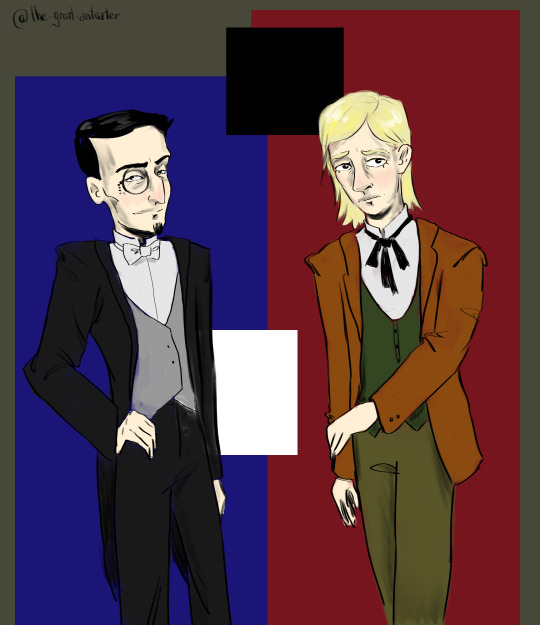
From a young age, they were very different. Aldous, one year younger than his brother, was sharp, keen and enterprising, always getting into various sort of shit. As he grew older, he became a handsome man, with his black hair, slender shape and a gaze of a raptor. He had success with women, but kinda never cared about romance - what he always craved was influence. And also he cared a lot about his brother, who was like the total opposite.
William was different. Silent and shy, with sad eyes and hair a little bit too long for that era. For a long time, he didn't know what he wanted from life. Yeah, he was smart, talented in art and chemistry – but none of these really interested him. He never even tried relationships, although there were ladies who were attracted by his mysterious image.
Living a rather reclusive life, William was more into books than social connections. And that changed his fate at some point.
In fact, he was the first one to start studying the historical archives of Rusty Lake, and found the records of Caroline Eilander about alchemy.
That's how he realized what an extraordinary place they lived, and most importantly – that magic was real. And even more importantly – he brought Aldous into his interest.
William delved deeper and deeper into his studie – as if he saw some kind of salvation in it. Alchemy, various beliefs, symbolic systems, mythologies, and magical practices...
At some point, he realized that books were not enough – and he set off for America. There he studied voodoo and learned about the two-spirit phenomenon. It had such a strong impression on him that he dug further with double enthusiasm.
After some time, he visited India – together with Aldous. There they both studied everything about reincarnation, levels of life, and the wheel of Samsara in detail. Besides this, in this culture, William again encountered people who did not fit into Western traditional gender roles – and gradually began to understand something about himself.
At that time, he and Aldous were not too old yet, and they decided to devote the rest of their lives to alchemy and magic, which they complemented with insights from other cultures. Each of them had their own goal, but working together was fine for both. And in the end, they managed to create The Elixir.
The rest – is already a told story.
33 notes
·
View notes
Text
The Buddha in different religions/beliefs.
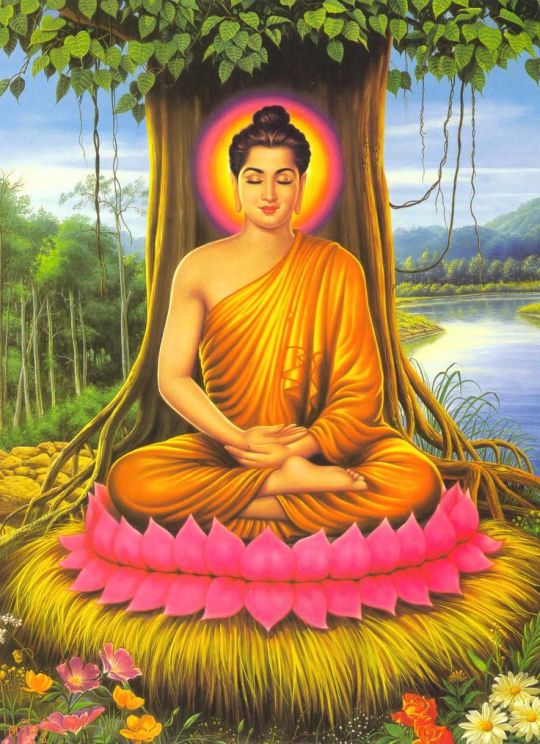
Firstly, who is the Buddha?:
The historical Buddha was a prince named Siddhartha Gautama who lived 2500 years ago in what is today northern India/Nepal. He was born into a warrior clan known as the Shakya, which is why he is often called Shakyamuni, “Sage of the Shakyas.” He is the one to later abandon worldly attachments, become enlightened, and found Buddhism.
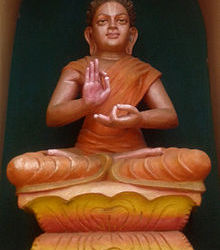
The Buddha in Hinduism.
Some Hindus consider the Buddha as the 9th avatar of Vishnu/Dashavatara, The Buddha was integrated into Vaishnavism, it was also believed the Buddha’s wife, Yasodhara, was the avatar of the wealth Goddess Lakshmi, though Buddhists deny this, so as other Hindus who identify the 9th avatar of Vishnu to another being who was also called “buddha”.
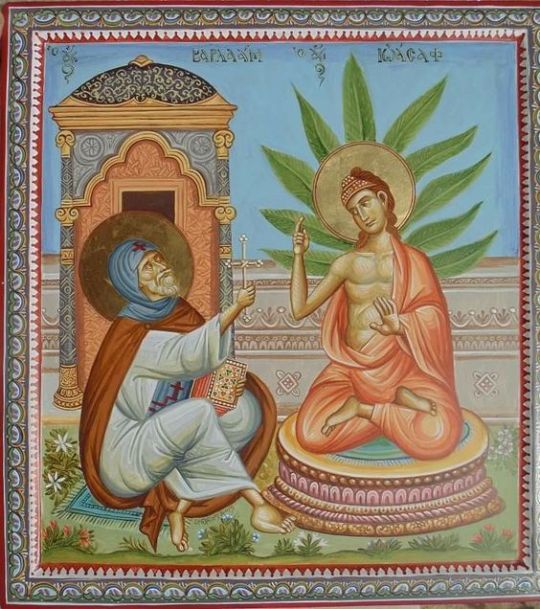
The Buddha in Christianity.
Called St. Josaphat (Budhasaf) of India, The story of St. Josaphat tells of a prince in India who is converted to Christianity by a monk, despite his father's attempts to prevent it. The monk and prince are later honored as saints in Christendom. The Buddha was honored as a Christian saint for about a thousand years, but this wasn't recognized until the mid 19th century.
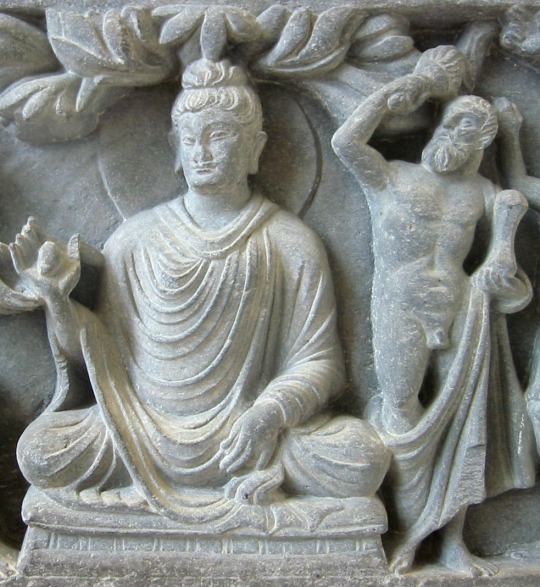
The Buddha in Hellenism.
Buddhism had a big influence on ancient Greeks, in which they would identify Buddhist beings with Greek beings, the Greeks were also the first ones to make Buddhist statues. Heracules (or Zeus) was identified with The bodhisattva Vajrapani, whom was seen as Buddha’s protector. There also was a Syncretism between The Buddhist Goddess Hariti & Greek goddess tykhe.
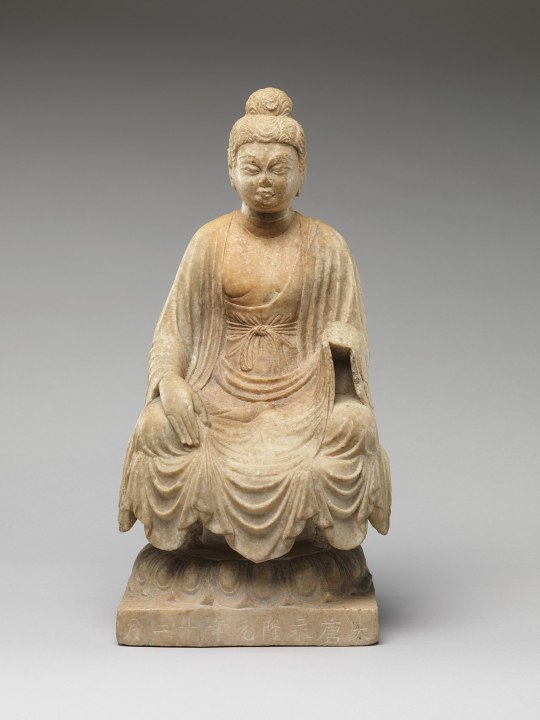
The Buddha in Taoism.
Some Taoist believe that the Buddha was a reincarnation of Laozi, the founder of Taoism. Some also believe he was either on the same power-level as the Jade emperor, the Taoist king of heaven, or stronger than him. 'Buddha' is absorbed wholly into the Taoist cosmology, becoming another term used to describe the generative tissue at the source of all things in both the mental and physical realms.
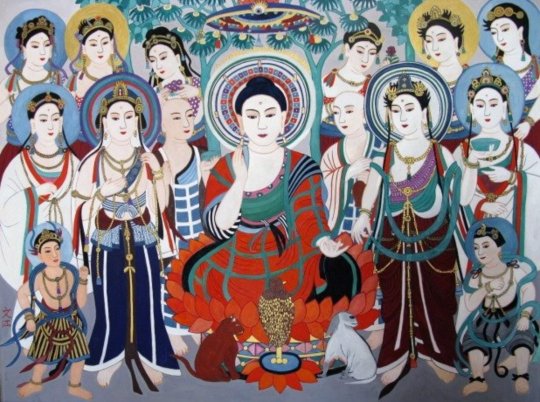
The Buddha in Shinto.
Buddhism & Shinto are mostly seen highly entwined in Japan. The buddha is called Shaka in Japanese & was transformed into a powerful Japanese deity, whom coexisted with the Shinto gods. Buddhist temples were often attached to Shinto shrines. A Shinto temple would sometimes have a priest of that shrine read a Buddhist sutra in which Shinto events took place.
#buddhism#buddha#buddhist art#hinduism#christianity#hellenism#Taoism#daoism#shinto#shintoism#religions#the buddha#Siddhartha#gautama#siddhartha gautama#shakyamuni buddha#shakyamuni#desiblr#lotus-list#buddhistwitch#desi#desi tag#mahayana#vajrayana#theravada#zen
22 notes
·
View notes
Text
Ramblings about Candace in Chromatic Ode of Candies and Roses
I was going to add this to my cynodace culture post but since it's mostly about Candace (and not all of it culture-related), I figured I might as well make it its own thing.
Candace and Music
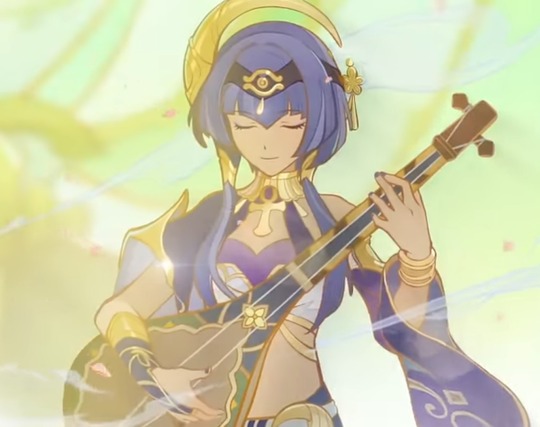
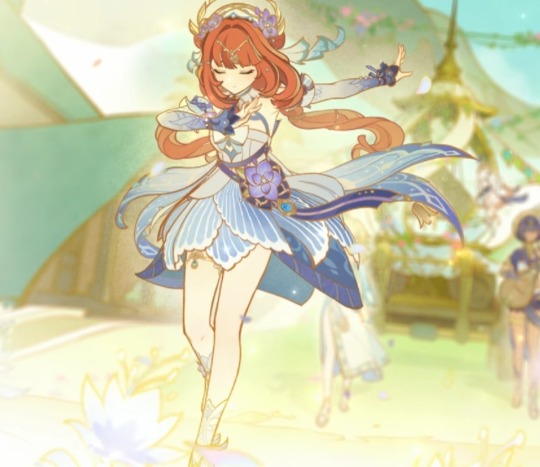
Candace and Nilou's performance at the parade being a parallel to the legend of the first ever Sabzerus Festival is already cool on its own. It strengthens their already-existing ties to Deshret and Malikata, respectively, and even a reincarnation-theory-neutral like me can enjoy that.
What caught my interest even more, however, were Candace and Deshret's instruments.
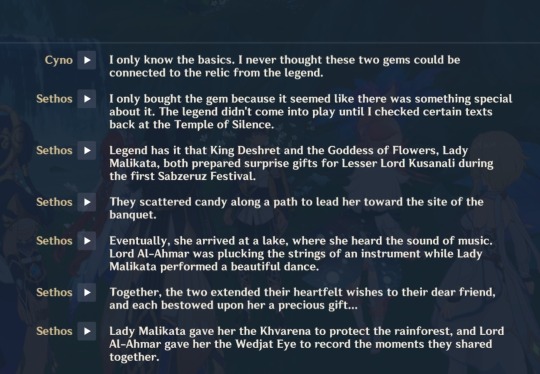
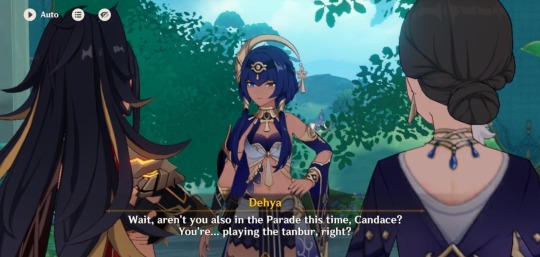
Deshret's is only described as an instrument with strings, while Candace's is explicitly named as the tanbur.
In real life, tanbur refers to several instruments from some parts of Asia, including India, Iran, and Iraq -- areas which heavily influence Sumeru's rainforest, but not so much the desert (except for the Girdle of the Sands area/Pari lore). So I like to think that the tanbur in Genshin is primarily a rainforest instrument, and Candace chose to learn it in part to connect to her father's cultural heritage.
Candace and Nahida
In a story primarily following Candace's point of view and centered around Nahida's birthday, it's...disappointing that they didn't so much as talk one on one.
But you could also argue that it might be intentional, at least on Candace's part. If you squint at some things. Mainly her voiceline on Nahida, which seems a little distant.
Perhaps it is a testament to the Dendro Archon's benevolence that I, a descendant of the Al-Ahmar bloodline, am able to live peacefully on this land. If so, I suppose I am grateful for this much, but... I am first and foremost a child of the desert.
Candace, "About Lesser Lord Kusanali"
She also wasn't mentioned in Alhaitham's Character Story 2 as one of the people who came to the Sanctuary of Surasthana to have discussions with him and Nahida. It seems she just... never really made contact with her even post-AQ (contrasted with Dehya who was part of the Surasthana meetings and has a voiceline about Kusanali being too light on the Sages).
Which makes her decision to take part in this parade interesting to me! It's like Candace is a little behind from everyone else in getting to know Nahida, but she now chooses to anyway, even if she's starting with silent observation and offerings of a performance. As someone who is steadfast in her duties even after finding out that the god who supposedly blessed her never did, she is probably the one least used to the concept of a god who is just...there, and not a distant thing of the past or something she could vaguely pray to.
It would be fun to see future Sumeru stories show her making progress on this. I would say I'm coping, but the fact that we got any Candace focus at all post-3.x has given me hope that anything's possible.
(Still bummed enough about the lack of interaction to draw something about it though)
Desert Gang shenanigannery
(I ship them all queerplatonically but feel free to read as whatever flavor you prefer)
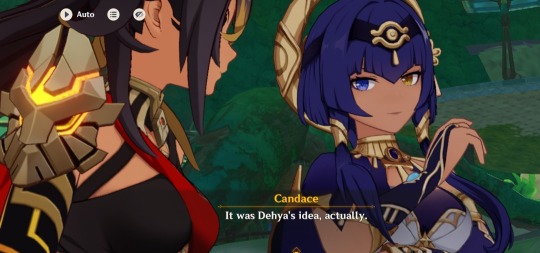
Ouh her smile...
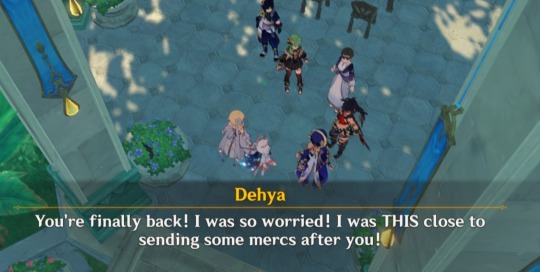
Also Ms. "Trying to save rowdy mercs fron Candace's wrath in her demo" Dehya is not immune to being a worrywart, I see. Very cute.
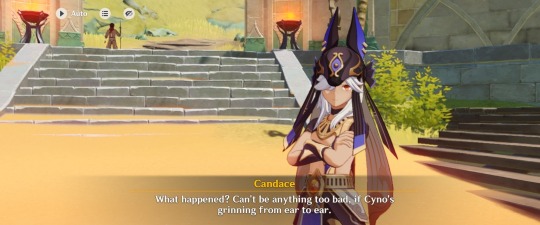
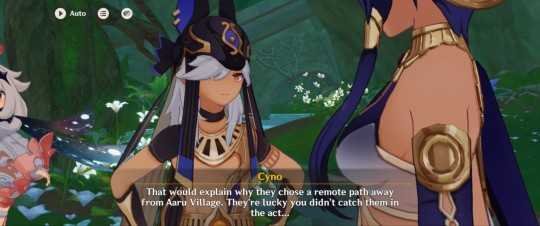

"I will encourage them being Worse" and Cyno's worse is "puns" and Candace's worse is "terrifying to troublemakers". I love them.
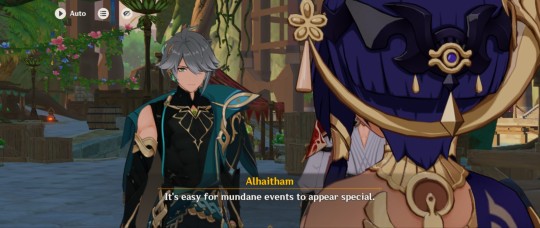
And finally. This line is not about them, I know. But I really like it combined with the Alhaitham and Candace focus. They're both very fond of their own "mundane" lives and have refused "better" job opportunities to keep said lives. Rotating this line in the Candace & Haitham corner of my mind constantly, I'm so glad we see them talk more.
Whew. Okay. Ramble over. Live laugh love Candace <3
#genshin impact#candace#genshin candace#candace genshin#kandake#genshin#desert gang#sumeru#image description in alt#i don't think this is long enough to add a read more? i hope??#but it was definitely long enough that I had to make it separate from my cnodace ramble
19 notes
·
View notes
Text

Writeblr Introduction...
Hey there, fellow adventurer!
Hey there! I’m Aayu (he/him), a newbie writer who spends a little too much time lost in fantasy worlds, building new adventures & stories, trying to create poetry that doesn’t always rhyme [oops! (ᵕ—ᴗ—)]. I’m here to share my writing, learn from all of you, and maybe even get lost in a few collaborative projects along the way. I’ve got a lot of ideas buzzing around in my head, and this space is where I’ll bring them to life. 🌟
A little bit about me:
Pronouns: he/him
Age: 19
INTJ / INFJ
Aries
Craves a whole lot of coffee! (⊙ _ ⊙)
Anime nerd ⎚-⎚
A fantasy-loving, world-building enthusiast
Sometimes you may catch me daydreaming about characters from movies and anime's who don’t know how to stay out of trouble...
Open to exploring any genre (but I mostly live in fantasy, fiction, poetry, and short stories)
Obsessed with adventure, complex plots, and creating characters who feel like friends (or enemies... depending on the day) >ᴗ<
Always here for tag games, writing prompts, and collaborating with other creative souls
What you’ll find on my blog:
My WIPs: From magical realms with strange mythical beasts to strange lands with lots of mystery, I'm always working on something new (and sometimes not quite finished, lol)
Poetry and Short Stories: Because who doesn’t love a little variety, right?
Collaborations: Let’s team up! I’m always looking to write with others, so feel free to talk to me in my inbox!
World-building and Adventure: Expect a lot of random world-building lore and the occasional overly-dramatic character monologue shit!
Introducing My WIPs:
1. Sherlock of Another World Genre: Fantasy / Mystery / Reincarnation / Magic Summary: A young boy, once a huge fan of Sherlock Holmes, is reincarnated into a world resembling the late Victorian era—only this world has an undercurrent of magic. After a fateful accident, he wakes up with his memories intact, determined to carve out a place for himself as the world's greatest detective. But this world is not full of political intrigue and societal drama; it also hides arcane secrets and mysterious forces that blur the line between logic and the supernatural. With his razor-sharp mind, well-stocked with knowledge of the methods employed by Holmes, he seeks to solve crimes that no one can. From the weird magical occurrences to secret societies controlling the arcane energy of the world, he weaves through an intricate web of riddles that may be more than he had in mind for himself. Will he turn out to be the Sherlock Holmes of this new world or will the magic and danger prove too much even for his brilliant mind?
2. The Eternity Clock Genre: Short Story, Magical Realism, Fantasy, Philosophical Fiction Summary: A small village in India’s Western Ghats, blending rich culture and mystical timepieces.
PS: Still working on some ideas so this section will be updated soon!
A Few Fun Things About Me (Besides Writing):
World-building is my like my jam. If I’m not writing, I’m probably mapping out cities or figuring out a character’s backstory or finding some inspiration to write from somewhere (and yes, I get really into it).
Music and Books are constant companions. I love finding the perfect inspiration to match's the mood of my stories.
I crave movies and animes—always on the lookout for something new to watch, even if my list is getting a little out of hand. (ㅅ´ ˘ `)
THANK YOU FOR YOU TIME!
Feel free to reach out if you want to scream about your WIPs, OCs, books, or any shared interests! Always up for a chat! 💬✨
#writeblr#fantasywip#adventure#worldbuilding#poetry#shortstories#writeblr intro#writerscommunity#writers of tumblr#writing#new writeblr#writeblr introduction#new writers corner#aayuuwrites
15 notes
·
View notes
Text
Unfairly Maligned Games, Vol. 3
Games I loved that got low scores, review bombed, or have some other weird negative stigma attached to them that I think is unfairly earned.
NOTE: I don't believe in giving games a number score or a letter grade. Maybe I'm just bad at criticism or very easy to please, whatever.
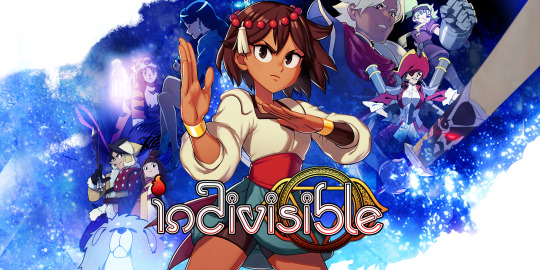
Indivisible [2019]
Mostly only known as the "from the makers of Skullgirls" game, Indivisible is another prime example of a game that was crowdfunded as one thing but turned into another, and gets a bad rap for its association with the ever-present controversiality of Skullgirls' creators. That said, I still think - as always - that it's crucial to view a game for what it is, not what it isn't. And what it IS is an extremely engaging mish-mash of genres and endearing characters, oozing with style and appeal, that fills a very particular void left behind by some of the most classic RPGs of a bygone era.
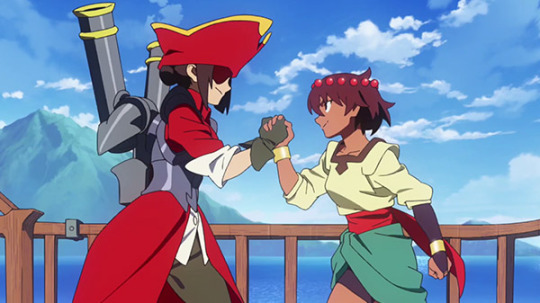
At its core, Indivisible is a 2D Metroidvania/RPG hybrid with an unusual battle system that plays similarly to an old PSX game series called Valkyrie Profile. During combat, each character's gauge will fill up, allowing them to take action(s). Your four party members are each assigned to one of the four face buttons on a controller (e.g. A, B, X, Y), and pressing that button will - in real-time - execute an attack on the enemy. Using it in combination the D-Pad allows for several different types of attack. All party members' attacks can overlap simultaneously, allowing you to string together combos to really rack up the damage, or juggle enemies to prevent counterattacks and break their defenses. The Metroidvania and platforming portion comprises the rest of the game, with a heavy focus on using those same action skills to scale massive environments, solve platforming puzzles, and dodge spikes. Typical Metroidvania stuff.
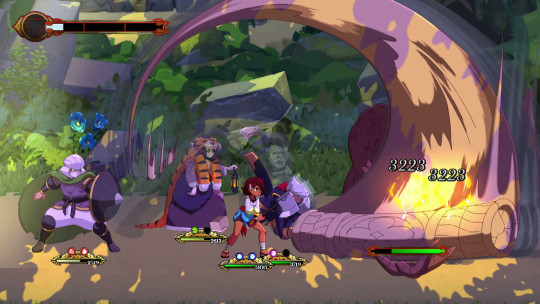
Story-wise, in our modern world of RPGs that is dominated almost exclusively by Japanese and Scandinavian narratives, Indivisible is breath of fresh air that focuses heavily on South and East Asian mythology and themes. Heavy inspiration is taken from the cultures of India, Tibet, Mongolia, and the South Pacific. This is reflected not only in the characters and their various ethnicities, but in the game's approach to spirituality, reincarnation, second chances, and being a teenager hellbent on destroying god. Our main protagonist Ajna is a teenager studying martial arts who isn't quite as in touch with her spirituality as her mentor would like her to be. When war strikes the land and burns her home to the ground, she gets pissed and sets out on a quest for retribution, discovering in the process that she actually does possess certain godlike powers of destruction, and also that she can absorb certain people into her head, which is just a cute way of lampshading having a Party System.
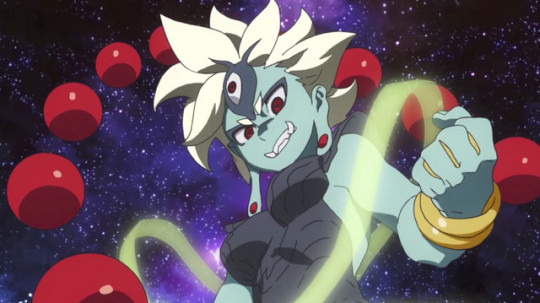
I've seen Reviewers and big Opinion-Havers on the internet criticize the game's writing for having a bull-headed protagonist who boldly rushes into confrontation, unleashing her wanton destruction without first considering the catastrophic consequences for civilians. It's almost like they've forgotten what being a teenager and making poor choices is like. But I say fuck 'em. I say we need MORE stories about uninformed teenagers with immense godlike powers and no sense of nuance making rash decisions and fucking up royally. That alone is crucial to understanding the rest of the game's themes about atonement, reincarnation, and understanding why you believe what you believe in. That's what Indivisible is all about. In many ways, I feel like Ajna shares a common story arc with Korra from the Avatar series, and it's very cool to see how she learns to deal with the damage she's caused and what insight that gives her when facing down the Big Bad.
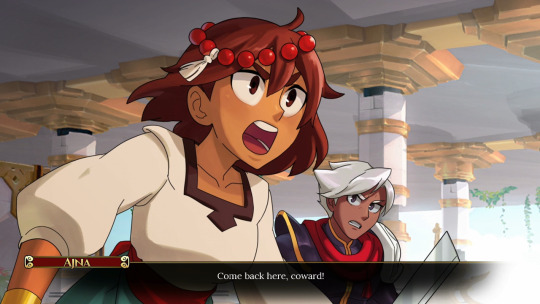
Of course, what is a good story without characters to flesh it out? The characters in this game are absolutely charming and multifaceted, coming from a wide array of different cultures and personalities, many of which are vastly underrepresented in not only RPGs but video games in general. Personal favorites include, but are not limited to, big booba water mom Thorani (based on a buddhist deity of the same name), Leilani the Hawaiian sharknado (spins around in a cyclone attack using a leiomano, a Hawaiian shark-tooth sword), lesbian pirate mom Baozhai (based on the famous Chinese pirate Ching Shih), and of course, local nihilistic swamp witch Razmi (a loose mishmash of Korean and Persian Zoroastrian shamans). The full cast of characters is enormous (well over 20 playable ones alone), and each one comes with a unique moveset and playstyle that not only keeps gameplay interesting, but matches their personality and the role they play in the story.
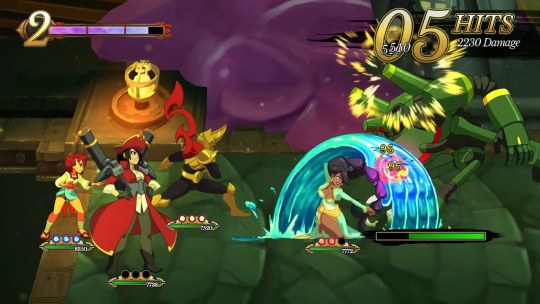
But if there's one thing I truly want to focus on when I gush about this game, it's this. Indivisible has one thing over most other games of its genre, something that modern RPGs in particular suffer heavily from a severe lack of, and that's its strong commitment to multiculturalism. Indivisible made a clear decision to not only feature characters from around the globe, but to blend their cultures together in interesting and exciting ways that don't diminish or water them down. Every character is allowed to shine in their own way without diluting what makes them stand out in the first place, which is why you can have a game that features a gunblade-wielding cowboy, a Namibian songstress, an armless Chinese dancer, a Kamen Rider knock-off, and a Mongolian archer who people keep mistaking for Pearl from Steven Universe. This sort of melting-pot cultural stew used to be common in classic anime and 90s RPGs, but kind of fell out of fashion with the rise of gacha waifu games and Elder Scrolls derivatives. Now more than ever, I feel like Indivisible is exactly the sort of injection the gaming world needs to rekindle those flames of pure imagination that the old classic era brought us.
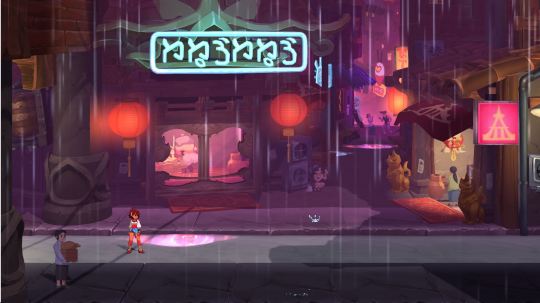
All that said, one of the biggest reasons Indivisible will always have a dark mark next to its name is of course due to the fact that its lead designer (the studio head) was involved in a sexual harassment case that resulted in everyone on the team either quitting or being laid off, and the rights to the work and characters getting lost in the shuffle. Additionally, the game was still finished and released as intended, but did not feature any of the guest star characters that were promised during crowdfunding, most of whom were indie darlings of the time (Shovel Knight, Hyper Light Drifter, and Super Time Force to name a few). Naturally, this has left a sour taste in many folks' mouths, so it is somewhat understandable why the game would have a negative stigma attached. There are also a few bizarre and possibly off-putting cameos hidden among the NPCs (a few outdated meme references and Zone-tan, of all people), but these are entirely skippable and serve only as background extras.
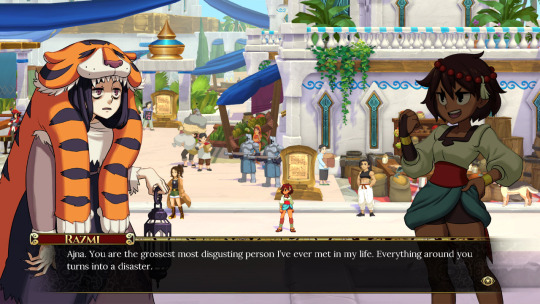
Sour grapes aside though, I wholeheartedly recommend Indivisible for anyone looking for a fresh take on action RPGs. The neat hybridization of Metroidvania and real-time RPG with fighting game mechanics gives it a very unique identity, and if the compelling spirituality of the story doesn't grab you, the charm of the characters absolutely will. It certainly took me for a ride. My only word of caution is to follow the game's own suggestion and get good at Blocking in combat as early as you can!
128 notes
·
View notes
Note
Hi! You seem to be the JTTW expert and I was wondering if you could clarify something for me; If I understand correctly, Wujing ate 9 of Tripitaka’s previous incarnations, right? If so, shouldn’t he be super-powered by all of them? After all, the reason the demons want to eat him is because Tripitaka cultivated power in his previous lives, which will give them immortality and power. Didn’t that apply to the previous monks?
The 13th-century oral JTTW openly states that Sha Wujing's antecedent has continually eaten Tripitaka:
Deep Sand said: "I am the one who devoured you twice before, monk. Slung from my neck are all your dry bones!" (Wivell, 1994, p. 1190). 深沙云:「項下是和尚兩度被我吃你,袋得枯骨在此。」
And since Tripitaka is the tenth reincarnation of Master Golden Cicada and Sha claims to have eaten nine previous scripture pilgrims (Wu & Yu, 2012, vol. 1, p. 210), it's reasonable to assume that Sha has eaten the monk's past nine lives. However, to my knowledge, JTTW never openly states that the Buddhist master had made previous attempts in his past lives to travel to India, or that he had been eaten by Sha in the process (someone please correct me if I'm wrong).
It's important to remember that Tripitaka, better known as Xuanzang (玄奘, 602-664), is not the only Chinese monk who has traveled to India for scriptures. Another famous scripture pilgrim is Faxian (法顯, 337- c. 422). So, the novel could be referring to other such monks.
But if we were to view the aforementioned nine monks as Tripitaka's past lives, I think the reason why Sha Wujing isn't empowered by their flesh is because their compounding life-long austerities only results in the tenth and final reincarnation being holy.
Fun Fact: The "Deep Sands" demon mentioned above is actually a vilified version of a spirit said to have originally helped Xuanzang in his 7th-century biography. This figure came to be worshiped as Jinja Taishō (深沙大將, “General of the Deep Sands”), a minor protector deity in Japanese Buddhism. One 11th-century Japanese source claims that the General manifested before Faxian in a wrathful form. Most importantly, the skulls around his neck are said to be those of demons, not monks (Dudbridge, 1970, p. 20)!
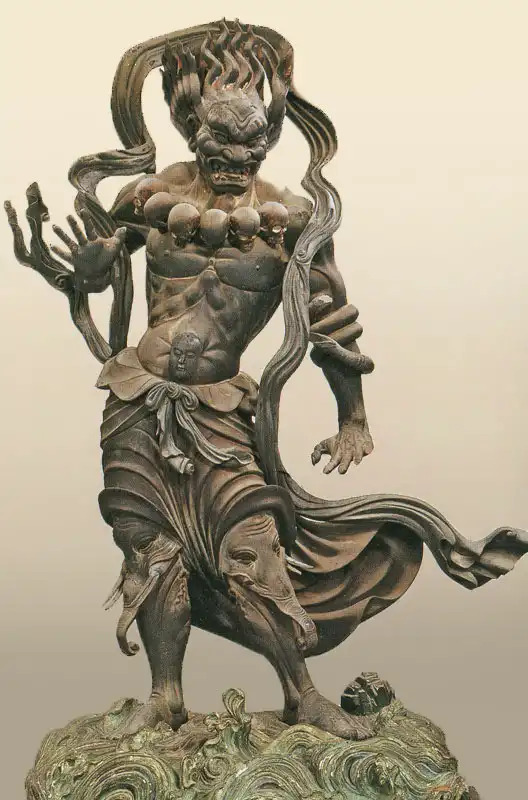
A 13th to 14th-century Japanese Kamakura carving of the General of the Deep Sands.
Sources:
Dudbridge, G. (1970). The Hsi-yu chi: A Study of Antecedents to the Sixteenth-Century Chinese Novel. Cambridge: Cambridge Univ. Press.
Wivell, C.S. (1994). The Story of How the Monk Tripitaka of the Great Country of T’ang Brought Back the Sūtras. In V. Mair (Ed.), The Columbia Anthology of Traditional Chinese Literature (pp. 1181-1207). New York: Columbia University Press.
Wu, C., & Yu, A. C. (2012). The Journey to the West (Vols. 1-4) (Rev. ed.). Chicago, Illinois: University of Chicago Press.
#Sha Wujing#Sandy#Friar Sand#Xuanzang#Tang Monk#Tripitaka#Tang#Journey to the West#JTTW#Lego Monkie Kid#LMK#Sun Wukong#Monkey King#MK
118 notes
·
View notes
Text
Orientalism as it is
Orientalism is the tendency to view eastern cultures and countries through a specific, often non-eastern lens, and it's a standpoint that others these cultures a lot. There are some people who say that the Avatar series is orientalist in the sense of how it's practically a white person's idea of an eastern world, not somebody with the lived cultural experience examining some of those ideas in such a story.
It becomes more evident that despite taking so much influence from both China (traditional Chinese characters have been used for the story) and India, the programme imposes an oddly western undertone in the way the superpowers are portrayed. It's often the four Greek elements of air, earth, fire and water but neither the five Chinese elements of wood, fire, earth, metal and water nor the five Indian elements of air, fire, earth, space and water.
The lack of any prominent Indian coded character who's neither Guru Pahtik nor those two villains (Pi and that thug) is kind of jarring since things like the concept of the avatar, reincarnation and even some of the names like King Bumi (odd since Bhumi is a girl's name) are taken from the South Asian cultures. That's not to say it never exerted any influence further east, but that it's strange to exclude more Indian coded characters there.
Not only that but somebody else also said that the way Avatar presents reincarnation is an affront to the Indian concept of it, where despite differences each new incarnation is a continuation of the other. Sort of like how sequels continue a story in some way, so the Indian concept of reincarnation is practically like this. Another person also pointed out how the Avatar's respective authors have a clear bias towards East Asia.
Despite how some of the ideas and concepts were taken from South Asia, it is rather strange why there aren't any prominent South Asian coded characters who aren't Guru Pahtik. Indeed it seems as if the Avatar creators reveal a troubling tendency in western geek circles where there's a tendency to kind of fetishise East Asian countries (Japan and to some extent, China and South Korea) but ignore, if not demonise West and South Asian ones.
Especially Arab and South Indian cultures, where names taken from the former are used for dissidents. It's even more ironic to think that the four Greek elements are in turn derived from the Iranian version, that I feel a version of Avatar that's more based on Middle Eastern cultures would be more organic. More believable than the East Asian and South Asian influences, since the Middle Easterners also inherently have this.
Particularly due to the influence of Zoroastrianism or something, though it's also surprising why there's not a single bender who's got a Middle Eastern name themselves. The lack of Middle Eastern-coded characters who aren't dissidents nor barbarians is strange, given it's Iran that originated the four elements. But then again I don't think it's particularly common for western geeks to be really into the Middle East.
I suspect one possible reason why anime gained so much traction in the west has to do with the ghost of Japonisme, an early trend in western art that takes cues from Japan as well as Chinoserie for China. But the ghost of Japonisme is stronger if it weren't for how popular Japanese comics and animation are among geeks, so it seems Avatar really is like a 2000s version of both Japonisme and Chinoserie.
Orientalism never left geek culture and especially western geek scenes, it's something that highly informs preferences and a viewpoint. It's not necessarily wrong to like Japan or even China, but that there's something about western geek culture's orientalism that rubs me the wrong way.
8 notes
·
View notes
Note
thank you for the reply and the information! I was curious how the other fox would fit in with PCB Extra's metatextual mention of Three Lands, but I hadn't even considered it might be three worlds and not three countries. this is neat
(Original post for context)
I forgot I left the response to this in my drafts, sorry. Luckily, this means I could update it with recently acquired knowledge when I found it again. Truth to be told, my point is less that the other fox is a better match, and more that Ran being Tamamo no Mae is one of these things which make sense at first glance, but the deeper you look into it, the less coherent it becomes.
This got much longer than I planned, so for organizational purposes let's refer to this post as Revenge of the "graveyard god", or why I don't think Ran is Tamamo no Mae. More under the cut.
The early Tamamo no Mae
The main point of connection between Tamamo no Mae and Ran are the nine tails, but that’s not even really a consistent part of the former's background. The oldest version of the story - which is really fun, the seduction section is pages upon pages of Tamamo and emperor Toba discussing esoteric Buddhism - states that she was “an 800-year-old two-tailed fox from the Nasuno Plain in Shimotsuke Province”. Early depictions of her true form follow this pretty closely:

Nezu Museum of Art, via Monsters, Animals, and Other Worlds. A Collection of Short Medieval Japanese Tales
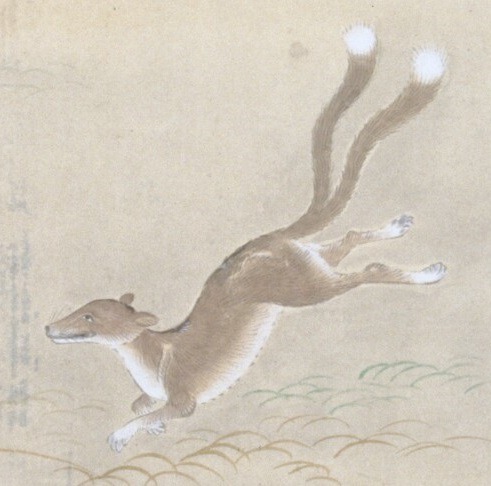
Kyoto University Rare Materials Digital Library

Suntory Museum of Art
As far as I am aware, the two tails are actually unique to her. Other foxes of note have either one tail or nine. While it does seem the belief in the number of tails growing with age is genuine rather than a modern misconception, it’s hardly central to fox folklore (I’ve seen the portmoneu “foxlore” at least once btw, it’s very funny). And, as I will outline later, it doesn’t even seem to be behind the idea of nine-tailed foxes in the first place. Anyway, the oldest version does provide Tamamo with more backstory, but it’s closer to presenting Shuten Dōji as a manifestation of Mara than to a straightforward “Tamamo is x under a pseudonym” popular today. As we learn, the two-tailed fox is in fact a reincarnation of a “graveyard god” (塚の神, Tsuka no Kami) from India, described in the apocryphal Humane Kings Sutra (it gets namedropped directly), likely originally composed in China.
How come? It all started when Kalmashapada, a prince of Devala in India, wanted to offer 1000 skulls of virtuous rulers to this deity because a suspicious “heretical” preacher convinced him it’s a good idea. After defeating and imprisoning 999 such kings, he encountered Shrutasoma, one of the previous incarnations of the historical Buddha, who managed to show him the error of his ways. All of the kings were released, and Kalmashapada was redeemed. The “graveyard god” was less than thrilled, and swore to keep reincarnating as a fox in kingdoms where Buddhism flourished to destroy it. We are told that happened many times, but only one past identity, that of Bao Si (Hōji), comes up. Obviously, eighth century BCE China was not exactly an area famous for Buddhist devotion, but that’s irrelevant here. We are told the endgame is not just to overthrow a righteous ruler, but also to become his replacement. Alas, Tamamo no Mae obviously fails at both of these goals. Still, points for trying.
The story does not provide the deity with a specific identity. However, Nobumi Iyanaga notes that in the referenced sutra he’s Mahakala (the original Makakaraten version, not the joyful Daikokuten). In East Asian Buddhism he is described as dwelling in the graveyards due to acting as both the chief of dakinis and their subduer. At the same time, Iyanaga argues in the context of the Tamamo no Mae story it can be argued he is either implicitly replaced by the dakini par excellence, Dakiniten (closely associated with foxes), or that the deity has no identity other than the fox one.
Later Tamamo developments
Two elements which are mainstays of modern retellings are missing from the oldest version, as you might have noticed. It doesn’t feature the Sesshōseki, which was only added later, seemingly as a way to promote Zen Buddhism, since this extension of the story casts a member of this school as the new protagonist. In the early variants Tamamo’s corpse was brought to the imperial treasury, the same one which shows up in a similar context in the tale of Shuten Dōji, and there is no indication she came back as a vengeful ghost, let alone that she repented and accepted Buddhism, as she does in some of the Sesshōseki variants.
The other difference is, as I already pointed out, the tails. The oldest depiction of a nine-tailed Tamamo no Mae I am aware of is Sekien’s. Based on a few papers I read it would appear textual variants of the story giving her nine tails might have been in circulation earlier, but that’s not reflected in any of the illustrated scrolls shown above.

Sekien's nine-tailed Tamamo (wikimedia commons)
Sekien claims that Tamamo no Mae is one and the same as Daji (I’ll get back to her later), and specifies the latter was a nine-tailed fox. He cites Zhang Dingsi’s Langye Dai Zui Bian (浪挪代醉編, “Langye’s Substitute for Drunkenness: A Compilation”) as his source for this tidbit, but does not explain where does the conflation of the two foxes come from. In contrast with the elaborate reincarnation scheme from the older version, he states Daji simply flew across the sea to reach Japan, without reincarnating.
What is now essentially treated as the “definitive” version of the Tamamo no Mae story, and what cemented her image as a nine-tailed fox, only dates back to 1805. That’s when Ehon Sangoku Yōfuden (絵本三国妖婦伝; “Tales of Enchantresses in the Three Kingdoms”) finished publication. The author, Ranzan Takai (高井蘭山), was an enthusiast of neo-confucian thought, and he wanted to write a story highlighting the time honored confucian belief that dynasties are brought down by suspicious concubines. The real goal was somewhat broader, though -the story of Tamamo no Mae was essentially repurposed as a critique of the concept of women playing an important role in public life.
It needs to be noted here that it is not impossible that the original was already part of a political polemic. Arguments have been made that Tamamo is a fictional representation of Bifukomon-in, for instance. They are certainly linked to the same emperor, Toba.

Bifukomon-in (wikimedia commons)
However, while I would not rule this out altogether, it’s hard to deny the typical medieval penchant for reinterpreting Buddhist material feels more central to the story. It is ultimately a very elaborate twist on the Humane Kings Sutra first and foremost. It belongs to the same world as other fabulous tales about figures from distant Buddhist lands arriving in Japan, alongside the likes of the legend of emperor Suwa of Hadai or the medieval Amaterasu narrative involving Mara (stay tuned for my post about that one).
Ideological motivations aside, in Ranzan’s version an anonymous nine-tailed fox appears as Daji in China, Kayō in India (seemingly a leftover of the original “graveyard god” story; here the prince is convinced to carry out his evil plans by his concubine instead though), and finally Tamamo no Mae in Japan. He also gives a unique account of Tamamo’s arrival in Japan, as far as I am aware: in his novel, she was brought there by Kibi no Makibi, a famous historical envoy to China. This was not his first time as a literary character, a much earlier picture scroll about his adventures is pretty funny (I have Touhou ocs based on it), but I’ll save this discussion for another time.
Not quite Tamamo: the influence of Daji
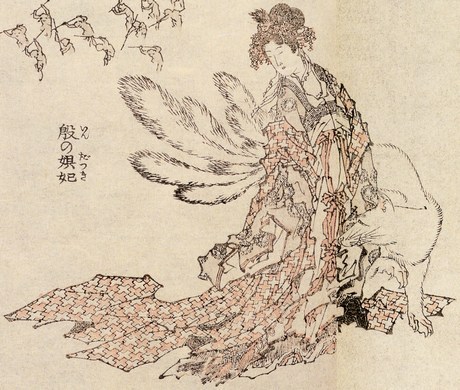
Daji, as depicted by Hokusai (wikimedia commons)
Daji requires some further discussion. She was initially regarded simply as a non-supernatural wicked concubine, but came to be treated as a fox posing as a human by the Song period. According to Xiaofei Kang the oldest evidence for that comes from 1101, from a Japanese text presumably reflecting an already extant Chinese belief. By the Yuan period it became a commonly accepted view, with Quanxiang Pinghua (全相平話) specifically stating Daji had nine tails. Her fox-like image was finally cemented fully by popular novels in the Ming and Qing periods.
Since there was a preexisting tradition in which Daji was a human woman, a remedy was developed: the “real” Daji was possessed by a fox, who took her name and identity. Curiously, the fox component of her story is otherwise not very important, and some modern authors basically characterize it as “tacked on”: she is the quintessential evil concubine bringing kingdoms to ruin out of a sense of cruelty who just happens to be a fox, and her story doesn’t really depend on preexisting fox-related motifs.
There are multiple accounts of Daji’s deeds, but the most famous one, and at the same time the most likely influence on Razan’s portrayal of her (and thus Tamamo), is Investiture of the Gods. However, he skips the origin attributed to her here: in the Chinese original, Daji is an agent of the goddess Nuwa, though she eventually overdoes it and is rebuked by her former boss for excessive cruelty. This doesn’t really fit well with Tamamo’s backstory, obviously; making her and Daji interchangeable was detrimental to both characters, I feel. A Chinese story dealing with Daji reincarnating does exist, but it’s not exactly similar. In the Ming novel Zhaoyang Qushi (昭陽趣事) she reincarnated as Zhao Hede, a concubine of emperor Cheng of Han. What happens next has been described as “pornographic entertainment enlivened by supernatural and historical costumes”. For more details, check out Rania Huntington’s book from the bibliography below.
Curiously, it is possible Daji was simultaneously an object of active cult, since there is a Song imperial edict outlawing the shrines dedicated to her, Wutong (a southern Chinese spirit who was believed to bring wealth and bewitch people, compared with foxes in the north) and “General Shi” (no clue who that might be, I’d hazard a guess one of the popular pacified vengeful spirit cults but don’t quote me on that). However, another contemporary source instead mentions the outlawing of temples of “fox kings”, so it might also mean that the name of Daji was applied by officials to an unrelated popular fox cult (“fox king” is a reasonably common appellation for supernatural foxes). Both regular and nine-tailed foxes are attested in such a context across history.
Early nine-tailed foxes
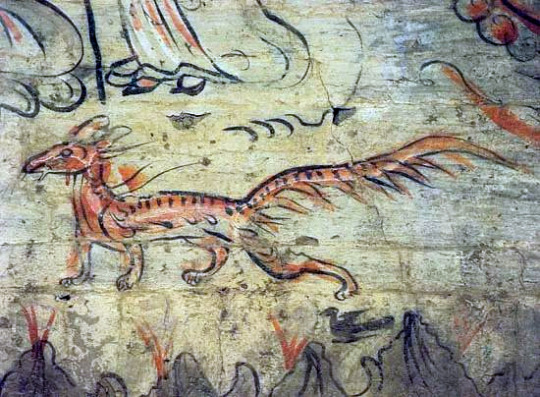
An early Chinese depiction of a nine-tailed fox (wikimedia commons)
The early portrayals of nine-tailed foxes are something I started looking into recently because of Ran’s freshly revealed connection to Yuuma: I figured it makes sense that she’d be in origin someone who belongs to the same world as the taotie.
Looking at the earliest Chinese sources, multiple nine-tailed foxes appear in legends about virtuous rulers like Tang, Wen or Yu the Great, essentially as generic good omens, without much fanfare. According to confucian commentaries from the Later Han period, the nine tails were understood as a sign a given emperor will have many descendants. The exception from this generally positive tendency is the Classic of Mountains and Seas, where the nine-tailed fox is described as “man-eating” (something very uncommon in Chinese fox literature). However, it also doesn’t exactly get more spotlight than the other creatures. It’s also treated as a separate animal from regular foxes, not as a particularly old fox. You could say it is to the fox what a bai ze is to an ox, I think. Visual arts add further specimens: the source of this discussion, the nine-tailed fox attendant of Xi Wangmu, later seemingly “decanonized”, and another belonging to the entourage of Zhong Kui. Both of these are hardly eminent and seem to fit the mold of auspicious omens. In Zhong Kui’s case the fox is in one case listed alongside the bai ze which only strengthens this impression. However, it also makes sense that its inclusion would reflect Zhong Kui’s role as a demon queller: he is often portrayed with conquered demons as servants, after all.
Conclusions

To sum up: ultimately it just doesn’t seem nine-tailed foxes are quite as big of a deal as popculture makes them seem, and nine tails are neither exclusive nor innate to Tamamo no Mae. Since that’s the only real point of connection between her and Ran save for a throwaway PCB line which leads to no further references, I maintain there’s no strong case for identifying them with each other, especially since there is no shortage of other candidates.
There’s also the fact that, Daji aside, most other nine-tailed foxes are largely blank slates you can do anything with, while Tamamo has many fairly unique characteristics which would be wasted by randomly slapping her name on Ran, in my opinion. To be fair, ZUN does occasionally make similar mistakes - Yoshika is the main example (remember, the actual legend about Yoshika’s immortality claims he decided to pursue eternal life after having a thrilling affair and has him call himself “strongest madman under heaven”).
I would personally argue ZUN himself probably did not feel strongly about who Ran is supposed to actually be when he originally came up with her, though. None of her spellcards reference Tamamo no Mae. Or any other fox identified with her, for that matter. They do have a more or less consistent theme, but that theme is, broadly speaking, “magic arts”, from onmyodo (Shikigami "Banquet of the Twelve General Gods"), through shugendo (Illusion God "Descent of Izuna-Gongen", Shikigami "The Protection of Zenki and Goki", Superhuman "Soaring En no Ozunu") and esoteric Buddhism (Shikigami "Channeling Dakiniten", Esoteric Sign "Odaishi-sama's Secret Key"), to contemporary stage magic (Shiki Brilliance "Princess Tenko -Illusion-"). In other words, I do not think canon actually strongly supports any specific option.
I will admit I’m biased but personally I think picking a different fox makes it much easier to accommodate Yuuma and their shared animal realm past, the most thrilling Ran development in ages. As for Tamamo, I do think she would be fun to see in Touhou, but preferably as her own character - with two tails, if possible.
Bibliography
Bernard Faure, The Power of Denial. Buddhism, Purity, and Gender
Rania Huntington, Alien Kind. Foxes and Late Imperial Chinese Narrative
Nobumi Iyanaga, Under the Shadow of the Great Śiva: Tantric Buddhism and its Influence on Japanese Mediaeval Culture
Idem, Dākinī in: Brill's Encyclopedia of Buddhism (vol. 2)
Xiaofei Kang, The Cult of the Fox: Power, Gender, and Popular Religion in Late Imperial and Modern China
Laura K. Nüffer, Lady Tamamo in: Keller Kimbrough and Haruo Shirane (eds.), Monsters, Animals, and Other Worlds. A Collection of Short Medieval Japanese Tales
Sumiko Sekiguchi, Gender in the Meiji Renovation: Confucian 'Lessons for Women' and the Making of Modern Japan
Chun-Yi Joyce Tsai, Imagining the Supernatural Grotesque: Paintings of Zhong Kui and Demons in the Late Southern Song (1127-1279) and Yuan (1271-1368) Dynasties
40 notes
·
View notes
Note
any cool desi books/media to recommend??
Okay to be fair I am not the biggest consumer of desi media HOWEVER. I have a few niche favourites (some of them come from my research for my Major Work in my final year in high school but here's a quick list):
The Namesake by Jhumpa Lahiri - god this entire book changed me fundamentally. It was like watching my own life play in fast-forward and getting hit in places I didn't want to be hit. if you are a first-generation desi in a western country, you will be on the ground sobbing
If You See Me, Don't Say Hi by Neel Patel - a collection of short stories that methodically break down some of the most subtle and pervasive stereotypes within desi cultures. I've only ever had time to read the first two stories but I'm hoping to get the full book someday
Unaccustomed Earth by Jhump Lahiri - an anthology I read for my senior year as well. Another one of this heart-wrenching pieces that just resonate with me like damn.
The Aru Shah series by Roshani Chokshi - it's Percy Jackson But Make It Desi and honestly such a fun read!! Reading about the Potatoes (this is what the reincarnated Pandavas call themselves not joking) is always bound to make my day
The Age of Kalki series by Vishwas Mudagal - I read this purely for inspiration on my own original novel, and it was fun to use for comparisons for research and my writing. Also, spy stuff and action and all that
The Spider-Man: India comics - hey, desi stuff is desi stuff, and I enjoy anything that has my boy Pavitr in it (I'll enjoy it even more when @/marvelentertainment hires me to write him a book)
The Ms. Marvel show and comics - in Iman Vellani we trust 🙏 also my girl has such a wonderful variety of comics like. she's so cool. i love her. hoping that Iman does a masterful job as she writes Kamala's newest comic
18 Days by Grant Morrison - listen. there is a 2015 graphic novel and there is a 2010 artbook for the 2015 book. They are both the same thing: a retelling of the Mahabharata but make it electronic/futuristic. Read the graphic novel for the story, but I HIGHLY HIGHLY recommend the 2010 artbook as well because my god the ART is just gorgeous. It obviously provides insight on the creation of Morrison's 2015 book but god it is just. so so sooooo good. Mukesh Singh is a beautiful artist I need to have his art tattooed on me
Any desi movies from the 90s-00s - my experience with tamil movies in that time period have always been good ones!! They're chill, they're funny, they're silly, they're romantic, they're thrilling. literally all of my favourite song come from this period (don't disregard movies from later periods either, I watched Brahmastra a few months back and it was lit as fuck).
English translations of popular desi stories - and these stories can be anything. from ye old prevailing Ramayana and Mahabharata to anything written by contemporary desi authors. They've got a lot to share
On a side note me complaining to my desi friends that I want good tamil representation in western media often led to me getting smacked in the face with Never Have I Ever (by my DESI friends! who say it is very good!!) and i just want to say no. don't watch that. as a tamil person living in a western country, i apologise for who Devi Vishwakumar is as a person. i will personally pay for your therapy (has only watched two episodes and was immediately turned off)
I'm giving y'all a whole day to ask me whatever
#agni of wisdom#me when. me when i don't engage with desi stuff outside of funny tamil musicals#you can very much tell that most of the stuff is india-centric. and like. yeah. i'm sorry. i haven't really delved into desi media-#-in other countries aside for some research. india is not the only south asian country and i absolutely recognise the fact that i should-#-probably widen my horizons#MARVEL HIRE ME PLS 🙏🙏🙏 I CAN MAKE PAVITR SOOOO POPULAR YOU HAVE NO IDEA 🤪⚡ (<- delusional)#desi media recs#desi#desi books#desi tumblr#me having no idea what desi tags to use lmfao
36 notes
·
View notes
Note
Do those who are expelled from heaven become demons? I think you told me something like that about Zhu Bajie and Sha Wujing. I also didn't understand the story of the Yellow Robe Demon very well. about the part about his romance with Jade Maiden and the whole reincarnation thing. Was he a demon in the beginning? Or did he become a demon when he left heaven?
So I have explained in a past post here of how demons are made.
From there you can see how people in heaven, or rather celestials, either leave or are expelled from heaven and turn into demons. Yellow Robe Demon has said that he left heaven from his position as one of the 28 constellations in order to be with his love the Jade Maiden. The Jade Maiden for whatever reason reincarnated into a human instead of just leaving heaven (maybe this was an easier path considering that leaving heaven without permission is a harder thing to accomplish for a servant). But in any case, she didn't remember the Yellow Robe Demon or their prior love and thus he kidnapped her. Tragic romance.
But once he was caught he was brought back to heaven and lost the demonic powers that he gained while eating humans on Earth. Here is a lost of demons that were once from heaven and became demons.
People
Zhu Bajie (豬八戒) deity - pig demon
Sha Wujing (沙悟淨) deity - river demon
Tang Sanzang / Golden Cicada (唐三藏 / 金蝉子) Buddha disciple - human
Yellow Robe Demon (黃袍怪) wood-wolf star - robe demon
Golden Horned King (金角大王) furnaces blower - horn demon
Silver Horned King銀角大王 furnaces blower - horn demon
Yellow Brows Great King (黃眉大王) Buddha disciple - brows demon
Baihuaxiu (百花羞) Jade Maiden in Heaven - human
Princess of India (天竺) Immortal Su'e - human
Honorary mention: Princess Iron Fan (鐵扇公主) wind goddess - Rakshasi (this is only mentioned in the Zaju play to be a former goddess, otherwise she was always a Rakshasi in Xiyouji)
Please note that Sanzang, the Princess of India, and Biguaxiu were the only fallen celestials who are human because they reincarnated properly. Zhu Bajie also reincarnated but he didn't lose his cultivation when he went to earth and therefore became a demon pig rather than living out his animal form in peace and waiting to be reincarnated into a human. All other fallen celestials choose to leave, with the expectation on Wujing who was banished, and it is to be expected that they turned into demons for giving into their desires and started to consume human flesh.
Animals
Yellow Wind Demon (黃風怪) pet - yellow marten (owner Lingji)
Lion-Lynx Demon / Azure Lion (獅猁怪 / 青毛獅子) pet - azure lion (owner Manjusri)
King of Spiritual Touch (靈感大王) pet - gold fish (owner Guanyin)
Single Horned Rhinoceros King (獨角兕大王) pet - Azure Bull (owner Laojun)
Scorpion Demoness (蠍子精) animal in heaven - scorpion (no owner)
Sai Tai Sui / Great King Jupiter's Rival (賽太歲) pet - golden hair wolf (owner Guanyin)
Yellow Toothed Elephant (黃牙老象) pet - white elephant (owner Samantabhadra)
Golden Winged Great Peng (金翅大鵬雕) pet - roc (owner Buddha)
White Deer Spirit (白鹿精) pet - white deer (owner Old Man of the South Pole)
Lady Earth Flow (地涌夫人) pet - rat (owner Li Jang and Nezha)
Grand Saint of Nine Spirits (九靈元聖) pet - Nine-Headed Lion (owner Taiyi Jiuku Tainzun)
Jade Rabbit Spirit (玉兔精) pet - moon rabbit (owner Chang'e)
It is noted that most pets or animals that escaped heaven were only spared because their owners came in time to stop Wukong or Bajie from killing them, with the exception of the Scorpion Queen as she had no owner and thus was killed. Pets have a far easier time to cultivate in heaven as they have access to scripture or magic items to aid in their escape and power growth, giving them a large advantage if they make it to earth and become demon rulers if they so wish.
#anon ask#anonymous#anon#jttw#journey to the west#sun wukong#xiyouji#ask#Zhu Bajie#Jade Rabbit Spirit#Grand Saint of Nine Spirits#White Deer Spirit#Golden Winged Great Peng#Yellow Toothed Elephant#Sai Tai Sui#Great King Jupiter's Rival#Single Horned Rhinoceros King#King of Spiritual Touch#Yellow Wind Demon#Lion-Lynx Demon#Azure Lion#Scorpion Demoness#Yellow Brows Great King
22 notes
·
View notes